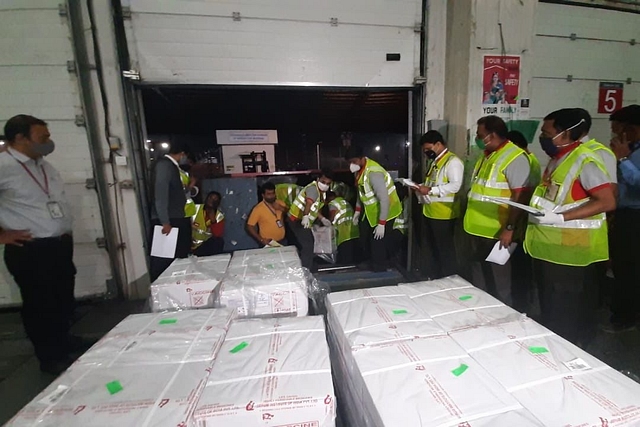
Explained: China’s Smear Campaign Against Indian COVID-19 Vaccine Being Supplied To Countries Across Globe
Since the coronavirus pandemic began, India has been at the forefront of supplying medicines and generic drugs to other countries
China is expectedly miffed as the quality and efficacy of Chinese vaccines have been questioned due to concealment of test data and lack of transparency
Chinese government’s mouthpiece Global Times has started a smear campaign against India’s vaccine diplomacy.
India has exported the Covishield vaccine produced by Serum Institute of India to Bangladesh, Bhutan, Nepal, Maldives, Myanmar, Seychelles, Mauritius etc. India is also set to export the vaccine to Afghanistan and Sri Lanka.
Apart from this, India has also exported the vaccine to Saudi Arabia, South Africa, Brazil, Morocco.
Many of the recipient countries have signed so-called vaccine pacts with India on a government-to-government basis to finalize the number of doses and determine whether they will be provided under grant assistance or under commercial terms.
According to a TOI report, Global Times has launched a “propaganda campaign” against India’s ‘Vaccine Maitri’ initiative.
Disregarding the human security goals amidst a world-wide pandemic that started from China, Global Times used a minor fire accident in the Serum Institute of India to question India’s capacity to manufacture the vaccine.
It also claimed that Indians in China were embracing the Chinese vaccine because of the perception of their superior quality over the Indian vaccines.
It is understandable that China is miffed at India’s vaccine diplomacy.
Despite claiming political and economic influence in the region, the Chinese have had little to offer to the countries. Even its close ally Cambodia recently requested India for vaccines after receiving a million doses from China.
Nepal’s regulator is yet to approve the Chinese vaccine; the Maldives government said there was no indication of any delivery of Chinese delivery so far; and Bangladesh refused to the Chinese demand that it contributes towards the development cost of the vaccine, hence a deadlock has ensued.
At the same time, the quality and efficacy of Chinese vaccines have been questioned due to concealment of test data and lack of transparency in information.
Reportedly, Brazil was initially planning to deploy China’s Sinovac but ultimately decided to opt for India’s Bharat Biotech because of the concerns about the efficacy and safety of the Chinese vaccine.
Harsh Pant and Aarshi Tirkey note in an ORF article that China has one big comparative advantage over nearly every other country that it has largely been able to control the pandemic within its borders, and its economy is mostly back on track. However, lack of transparency is a big issue.
They note:
India is already known as pharmacy of the world. It is the largest producer of generic medicines, accounting for 20 percent of their global production. It meets 62 percent of the global demand for vaccines.
Since the coronavirus pandemic began, the country has been at the forefront of supplying medicines and generic drugs to others. India received requests from more than 100 countries for hydroxychloroquine (once thought to help treat COVID-19) and paracetamol (a painkiller), and sent supplies to Brazil, the United States, and Israel. By May 2020, India was spending $16 million on pharmaceuticals, test kits, and other medical equipment for about 90 countries.